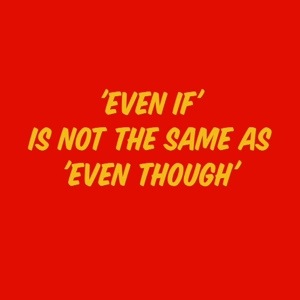
A lot of false shortcuts are taught to English students. Lots of words and phrases are said to be “the same” because it is quicker to teach them to beginning and intermediate learners without explaining them. ‘Even if’ and ‘even though’ are not the same but teachers often say they are.
In this first example, ‘if’ causes a conditional; ‘though’ explains a reaction to an action.
Even if you come, you won’t enjoy it.
Even though you come, you don’t enjoy it.
In the second example, ‘if’ is a conditional, explaining an unlikely situation or just an idea; ‘though’ talks about an experience.
Even if you came, you wouldn’t enjoy it.
Even though you came, you didn’t enjoy it.
In the next example, ‘if’ comments on what didn’t happen; ‘though’ comments on what did happen.
Even if you had come, you wouldn’t have enjoyed it.
Even though you had come, you didn’t enjoy it.
In this final example, ‘if’ and ‘though’ have similar meanings but have different nuances. ‘If’ talks about a possible plan whereas ‘though’ talks about a definite plan.
Even if you are coming, you won’t enjoy it.
Even though you are coming, you won’t enjoy it.
This is a bit tricky but I hope you understand this better.
